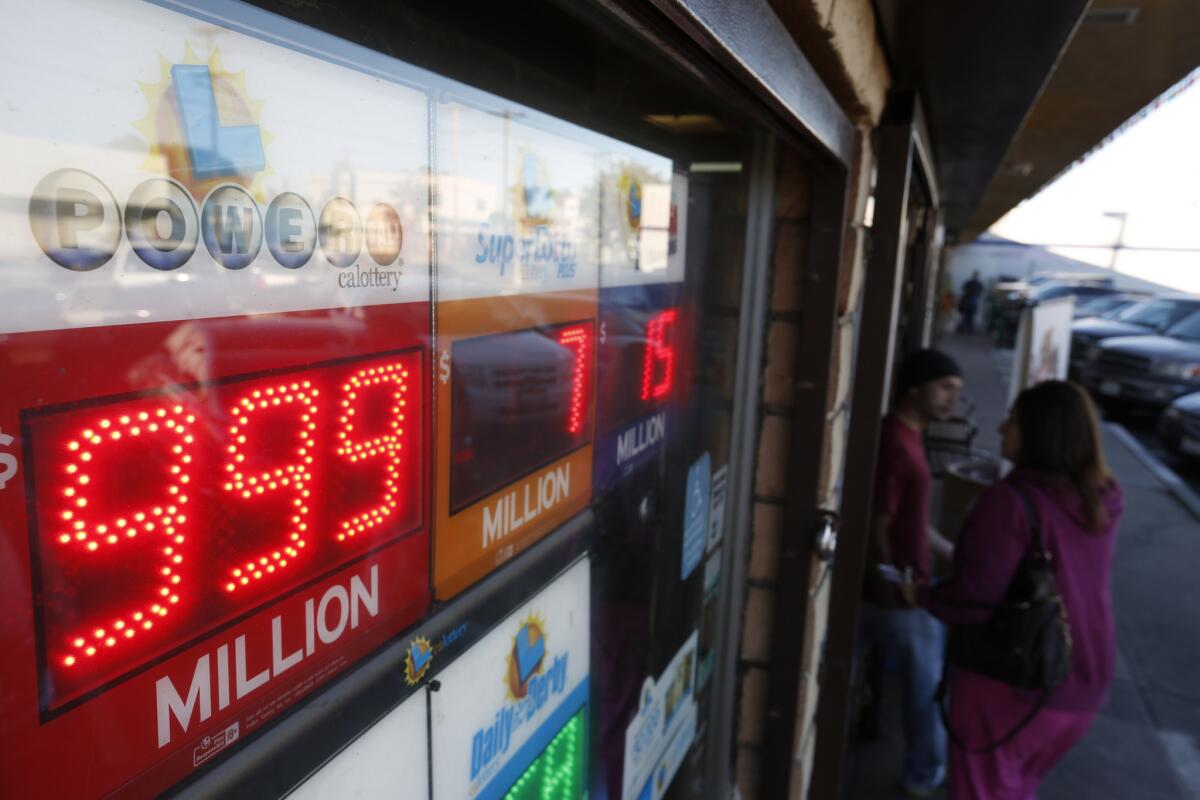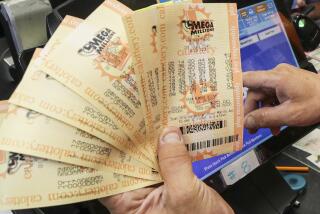Q&A: Powerball frenzy: For some, ‘an escape from the feeling of poverty’

The Powerball numbers on the sign at Mr. C’s Liquor in San Pedo can’t reflect the acutal jackpot which is valued at more than a billion dolllars. The lottery’s jackpot has risen to a record $1.5-billion.
- Share via
So, is Powerball fever harmless entertainment or something more sinister?
That is among the questions some are asking as the multistate lottery’s jackpot has risen to a record $1.5-billion and created a frenzy.
Who plays lottery games in California?
Lottery players are “vastly similar to California’s population in terms of demographics,” said California Lottery spokesman Alex Traverso.
Duke University economist Charles Clotfelter, co-author of the book “Selling Hope: State Lotteries in America,” said looking at the demographics of players without considering how much each group spends misses the point.
Clotfelter and other researchers say it’s well established that low-income players spend a greater percentage of their income on the lottery. Some studies have also found that low-income people spend more in actual dollars than higher-income players, experts said.
Is it more than just entertainment?
David Just, a Cornell economist, said his studies have shown that low-income players don’t just play for entertainment. “It seems like they’re really trying to play this to win,” he said. His research has also found that as unemployment increases, unemployed people play the lottery more often.
George Loewenstein, a professor of economics and psychology at Carnegie Mellon University, and other researchers found in one study that people made to feel poor bought more lottery tickets.
The findings, he said, “suggest that lottery tickets provide an escape from the feeling of poverty.”
Lottery officials see it differently.
“The tickets are $2 and serve a purpose if it’s their entertainment,” Traverso said. “Ultimately, the bottom line — if they have $2 in their pockets and this is what they like to do, then that’s what they’re going to do.”
What are the odds of winning powerball?
The odds of winning the Powerball jackpot are about 1 in 292 million.
How much goes to schools?
Times Sacramento Bureau Chief John Myers examined this questions in a story today.
Here’s one key point:
While the numbers fluctuate slightly, over time the California Lottery has provided slightly less than 2 cents of every dollar in what’s spent to operate K-12 schools.
In fact, two pennies of every dollar is the high-water mark. Data compiled by the independent legislative analyst’s office shows that for most of the past decade, the lottery has provided closer to 1% of school funding. In the 2016-17 budget proposed by Gov. Jerry Brown last week, K-12 education is slated to receive a total of $86.5 billion from all sources; the lottery’s share is about $1.1 billion.
The reason is pretty simple. In order to entice Californians to buy a ticket, most of the cash has to go to the lucky ticket holders as the jackpot.
See more of our top stories on Facebook >>
MORE ON POWERBALL
Here’s $100. Can you win $1.5 billion at Powerball?
Powerball jackpot still rising, reaches $1.5 billion
How the Powerball rules were tweaked to make the game an even bigger ripoff
More to Read
Sign up for Essential California
The most important California stories and recommendations in your inbox every morning.
You may occasionally receive promotional content from the Los Angeles Times.
















